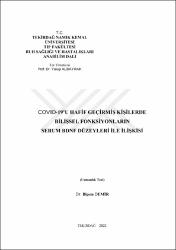| dc.contributor.advisor | Albayrak, Yakup | |
| dc.contributor.author | Demir, Biçem | |
| dc.date.accessioned | 2023-04-27T20:40:55Z | |
| dc.date.available | 2023-04-27T20:40:55Z | |
| dc.date.issued | 2022 | |
| dc.identifier.uri | https://tez.yok.gov.tr/UlusalTezMerkezi/TezGoster?key=kScA8XnrRb0WogX-qPGFkiBfQvjluqW4kU8RLhW6DapEa4khhblH2msr0Zh11Fq_ | |
| dc.identifier.uri | https://hdl.handle.net/20.500.11776/11461 | |
| dc.description.abstract | Koronavirüs Hastalığı 2019 (COVID-19) pandemik bir hastalık olup, hastalığın uzun vadeli sonuçları ile ilgili literatür bilgileri halen kısıtlıdır. Son zamanlarda hastalığın uzun vadede bilişsel fonksiyonlara olan etkileri üzerine yapılan çalışmalar artmış, hastalığı hafif geçiren kişilerde bile bu etkilerin ortaya çıkabildiği gösterilmiş, çeşitli mekanizmalar ileri sürülmüş ancak hiçbiri tam olarak kanıtlanamamıştır. Çalışmamızda bu bilişsel etkilerin mekanizmasını aydınlatmak amacıyla Koronavirüs Hastalığı 2019 (COVID-19)'u hafif geçirmiş kişilerdeki bilişsel fonksiyonların nöropsikiyatrik testlerle değerlendirilmesi, serum Beyin Kaynaklı Nörotrofik Faktör (BDNF) düzeylerinin ölçülmesi ve aralarındaki ilişkinin incelenmesi amaçlanmıştır. Çalışmamıza, Koronavirüs Hastalığı 2019 (COVID-19)'u hafif derecede geçirmiş 54 kişi ve yaş, cinsiyet, beden kitle indeksi (BKİ), eğitim düzeyi ve sigara kullanımı açısından eşleştirilmiş 36 sağlıklı kontrol dahil edilmiştir. Her iki gruba da bilişsel fonksiyonların ölçülmesi amacıyla nöropsikiyatrik testler olan Stroop Testi TBAG Formu ve Görsel İşitsel Sayı Dizileri Testi B Formu uygulanmıştır. Tüm katılımcıların Enzyme-Linked Immunosorbent Assay (ELISA) yöntemi ile venöz kandan serum Beyin Kaynaklı Nörotrofik Faktör (BDNF) düzeyleri çalışılmıştır. Vaka grubunda, sağlıklı kontrol grubuna göre nöropsikiyatrik test puanlarının çoğunda anlamlı olarak bilişsel düşüşü ifade eden farklılık saptanmış ve Koronavirüs Hastalığı 2019 (COVID-19)'u hafif geçiren kişilerde dahi bilişsel bozulmaların olduğu bir kez daha kanıtlanmıştır. Serum Beyin Kaynaklı Nörotrofik Faktör (BDNF) düzeyleri vaka grubunda daha düşük bulunsa da her iki grup arasında anlamlı bir farklılık saptanmamış, vaka grubunda Serum Beyin Kaynaklı Nörotrofik Faktör (BDNF) düzeyleri erkek cinsiyette kadın cinsiyete göre anlamlı olarak daha düşük bulunmuş ve hastalığı geçirmiş özellikle erkek cinsiyetteki kişilerde Serum Beyin Kaynaklı Nörotrofik Faktör (BDNF) düzeylerinin daha geniş popülasyonlarda çalışılması gerektiği düşünülmüştür. | en_US |
| dc.description.abstract | Coronavirus disease 2019 (COVID-19) is a pandemic, on which the relevant literature is still limited with respect to its long-term consequences. Recently, the number of studies concerning the effects of the disease on cognitive functions in the long term has increased, with their results indicating that the effects can occur even in people who have recovered with mild sypmtoms. In this regard, various mechanisms have been suggested, though none of them have been fully proven. In an effort to elucidate the mechanism of these cognitive effects, this study aimed to evaluate the cognitive functions of people who had recovered from Coronavirus Disease 2019 (COVID-19) with mild symptoms, by means of neuropsychiatric tests, as well as to measure serum Brain-Derived Neurotrophic Factor (BDNF) levels and to examine the relationship between them. Our study included 54 people with a history of mild Coronavirus Disease 2019 (COVID-19) and 36 age-, gender-, body mass index (BMI)-, education level-, and smoking- matched healthy control subjects. Both groups were administered a Stroop Test TBAG Form and Auditory Verbal Digit Span Test- Form B, which are neuropsychiatric tests, in order to measure cognitive functions. All subjects' venous blood samples were collected to examine the Serum Brain-Derived Neurotrophic Factor (BDNF) levels through the Enzyme-Linked Immunosorbent Assay (ELISA) method. When compared to the healthy control group, the case group presented a statistical significance in most of the neuropsychiatric test scores, indicating a cognitive decline and proving once again the presence of cognitive impairments even in people who had recovered from mild coronavirus disease 2019 (COVID-19). In conclusion, even though serum Brain-Derived Neurotrophic Factor (BDNF) levels were found to be relatively lower in the case group, no statistical significance was found between the two groups. Also, serum Brain-Derived Neurotrophic Factor (BDNF) levels in the case group were found to be significantly lower in male subjects than in female ones. We, therefore, suggest that serum Brain Derived Neurotrophic Factor (BDNF) levels be examined in larger populations, especially in men who have had the disease. | en_US |
| dc.language.iso | tur | en_US |
| dc.publisher | Tekirdağ Namık Kemal Üniversitesi | en_US |
| dc.rights | info:eu-repo/semantics/openAccess | en_US |
| dc.subject | COVID-19 | en_US |
| dc.subject | BDNF | en_US |
| dc.subject | Bilişsel | en_US |
| dc.subject | COVID-19 | en_US |
| dc.subject | BDNF | en_US |
| dc.subject | Cognitive | en_US |
| dc.subject | Psikiyatri | en_US |
| dc.subject | Psychiatry | en_US |
| dc.title | COVID-19'u hafif geçirmiş kişilerde bilişsel fonksiyonlarınserum BDNF düzeyleri ile ilişkisi | en_US |
| dc.title.alternative | The relationship between cognitive functions and serum BDNF levels of people with a history of mild COVID-19 | en_US |
| dc.type | specialistThesis | en_US |
| dc.department | Enstitüler, Tıp Fakültesi, Ruh Sağlığı ve Hastalıkları Ana Bilim Dalı | en_US |
| dc.identifier.startpage | 1 | en_US |
| dc.identifier.endpage | 84 | en_US |
| dc.institutionauthor | Demir, Biçem | |
| dc.relation.publicationcategory | Tez | en_US |
| dc.identifier.yoktezid | 735154 | en_US |



















